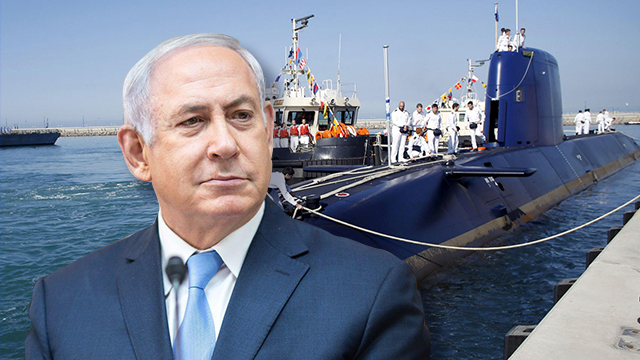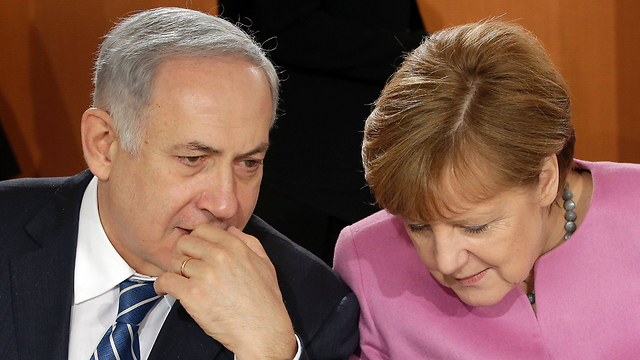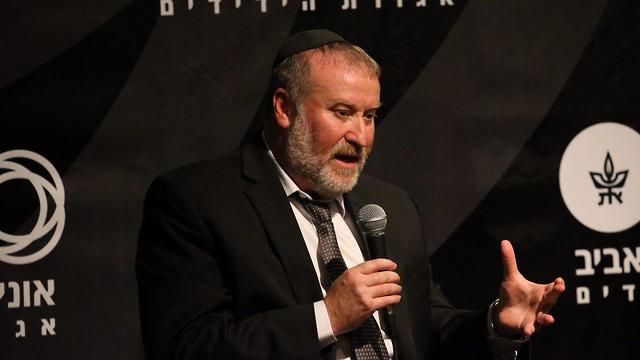
'Interrogating PM Netanyahu will not compromise submarine deal'
Senior legal, law enforcement officials examine possibility of Germany bowing out of submarine procurement deal if PM Netanyahu is questioned under caution; examination, international legal experts say deal will not necessarily be in danger, despite German 'escape clause.'
Law enforcement officials held a strategic-legal inspection to examine whether questioning Prime Minister Benjamin Netanyahu under caution on the submarine probe could lead to Germany bowing out of the massive defense deal, Ynet learned Thursday morning. The inspection's results said the deal will not necessarily be compromised if that occurs.
The inspection was undertaken due to reservations voiced by German officials stemming from suspicions of corruption surrounding a deal to purchase submarines and other navy vessels from the German ThyssenKrupp corporation.
While the German government approved the submarine deal with Israel this past October, it appended a limitation clause to the deal in which it stated that if it became known corruption by decision makers or politicians tainted the transaction, it will be able to back out of it.

The complex agreement, it came to light Thursday, also influenced Israeli law enforcement's decision making when progressing through the multifaceted investigation.
In light of the findings uncovered so far in the course of the probe, which has led to the arrest of multiple senior political and defense officials, police sources have believed for a long time the premier should also be questioned.
Interrogators, however, have only been cleared to collect open testimony from Netanyahu for now, but may be able to deem him questioned under caution later on.
Netanyahu probe may have national security ramifications
Law enforcement's quandary, in fact, has little to do with whether Prime Minister Netanyahu should be questioned—or at the very least asked to provide testimony—but rather with the question of when to do it.
Unlike previous instances of Netanyahu being questioned under caution—such as the illicit gifts affair and Netanyahu's conversations with Yedioth Ahronoth owner and publisher Arnon Mozes—questioning the premier under caution on the submarine affair may have ramifications extending far beyond the legal or political spheres—going into the realm of national security.

This past October, Yedioth Ahronoth journalist Ronen Bergman made public Germany's decision to approve a Memorandum of Understanding (MoU) with Israel on the purchase of three additional Dolphin submarines, and that Israel was notified of the fact.
The MoU underwent several changes following pressures exerted by senior German officials who sought to create a framework that would enable Germany to easily pull out of the deal in accordance with developments relating to the ongoing investigation into the submarine scandal investigation, also known as Case 3000.
The Germans' vacillation stems from their desire to avoid as much as possible infringing stringent Organization for Economic Cooperation and Development (OECD) guidelines on battling corruption.
Sources with knowledge of the details said then that the Germans approved the deal in a process involving Attorney General Avichai Mandelblit, the National Security Council and the Defense Ministry.
The clause inserted into the agreement stated that no criminal wrongdoing should be found in the conduct of decision makers or senior public servants involved in decision making regarding the deal.
It was also stated Germany nevertheless reserved the right to bow out of the deal even if investigations turned up nothing at all or no significant corruption. Plainly put, Germany maintained the right to interpret by itself the investigation, its findings and any potential subsequent trials, and decide whether and when to abort the deal.
Legal experts: 'Deal not in danger even if PM is questioned'
Upon consideration of the situation, strategic talks have been held over the past few weeks on the matter of ramifications and the potential side effects of questioning under caution a persona as high ranking as the prime minister, as well as Israel's ability to actually realize the deal.
Senior Justice Ministry, police and defense establishment officials took part in the discussions, as well as sources close to the German government. The talks' goal was to reach an agreement according to which even if corruption was uncovered, the deal will not be aborted so long as Israel was seen to be taking the requisite steps to excise it.
In so doing, Yedioth Ahronoth has learned, police and the Justice Ministry are basing their actions on well-known OECD principles on combating corruption, according to which such a deal does not have to be aborted if the elements of corruption are cleansed.
The most significant disagreement arising from the discussions divided those who feared the investigation will lead to aborting the deal and those who claimed not questioning Netanyahu under caution may permanently taint it with suspicions of corruption.
An attendant argument said reviewing possible criminality in the deal had to take place completely independently of the submarine transaction going through.
In addition, law enforcement officials have decided recently to green-light interrogating the prime minister and simultaneously tackle any international consequences. Internationally renowned legal experts were thus consulted with, and were said to have sided with the position saying the deal would not necessarily be in danger of coming apart even if the premier was questioned under caution.
The Justice Ministry offered comment on this report, saying it refused to "address speculation" and to confirm or deny any of its details. Police said it declines comment on active investigations.
Arnon Mozes is the publisher and owner of Yedioth Ahronoth Group, which includes Ynet and Ynetnews.











